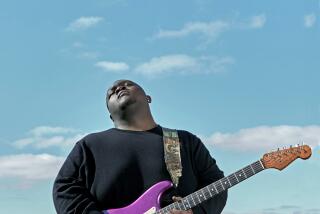JAZZ REVIEWS : Whitfield Brings His Quick Pick to the House of Blues
- Share via
Maybe it was the pressure of playing in the gaudy environment of L.A.’s hottest music venue. Or maybe it was just opening night jitters. Whatever the cause, Mark Whitfield’s early set at the House of Blues Wednesday was a wearying study in hyperactive guitar playing.
The crisp, authoritative jazz statements that characterize Whitfield’s work on his new recording, “True Blue,” rarely surfaced in his energetically demanding solos. Although he performed several numbers from the album--notably his own “Blues for Davis Alexander” and a Coltrane classic, “Mr. Syms”--most fell prey to a seemingly dogged effort to fill every inch of his musical lines with as many notes as possible.
Almost without exception, Whitfield doubled and quadrupled the rhythmic meter in his improvisations, ripping off endless streams of 16th, 32nd and even 64th notes. Only on an occasional melodic statement did he reveal the subtle feeling for nuance, contrast and touch that he’s so clearly capable of expressing.
Perhaps ironically, he was very nearly upstaged by his 4-year-old son, Mark, who joined the band on drums for Thelonious Monk’s “Ba-Lue Bolivar Ba-lues Are.” The tiny tot played remarkably well, and did so with a strikingly mature range of musical dynamics.
Unfortunately, the senior Whitfield’s own dynamic range was too often bounded by rapidity and note production rather than sensitivity and musical introspection. A potential franchise player, Whitfield won’t reach the next level of jazz achievement until he finally outgrows his nickname from his Berklee Music School days--”Quik Pik.”
Improv Lessons From Morgan, Tapscott
What alto-saxophonist Frank Morgan and pianist Horace Tapscott are doing at the Jazz Bakery this week--performing as a duo--is a difficult and risky business. It’s jazz reduced to its essence, improvisation in which each player has only the other to deal with for support, contrast and sheer musical sustenance.
On Wednesday night, though, sometimes it worked and sometimes it didn’t.
A spare and moody “K.C. Blues,” for example, was spontaneously connected with the mournful ballad “Goodbye.” The result was a moving musical eulogy for Charlie Parker, Morgan’s greatest inspiration, made even more effective by a rolling, two-handed solo passage by Tapscott that both echoed and extended the infectious rhythms of the Kansas City style.
Occasionally, tunes vaguely wound down before eventually expiring. Fortunately, there also were times when potentially embarrassing moments of confusion and uncertainty led to totally unplanned new musical explorations.
In addition to their duo numbers, Morgan and Tapscott, who continue at the Bakery through Saturday, each played a solo piece. Tapscott’s “A Ballad for Samuel” typified his quasi-classical improvisational technique, utilizing a softly lyrical waltz as the springboard into segments that were as orchestral as they were pianistic--exploding with massive block-chording and bombastic rhythms.
Morgan’s showcase took a different tack. His gorgeously sensual renderings of “You Must Believe,” “Don’t Blame Me,” “A Flower Is a Lovesome Thing” and “When You Wish Upon a Star” were testimony to a quest for great depth by means of great simplicity. His once rather ornate style has matured into a dark, almost painfully focused musical vision that reaches out and demands the listener’s attention.--D. H.
* Frank Morgan and Horace Tapscott at the Jazz Bakery, 3233 Helms Ave., Culver City. (310) 271-9039. $20. Morgan and Tapscott play two sets each night, 8:30 and 10:30, through Saturday.
More to Read
The biggest entertainment stories
Get our big stories about Hollywood, film, television, music, arts, culture and more right in your inbox as soon as they publish.
You may occasionally receive promotional content from the Los Angeles Times.










